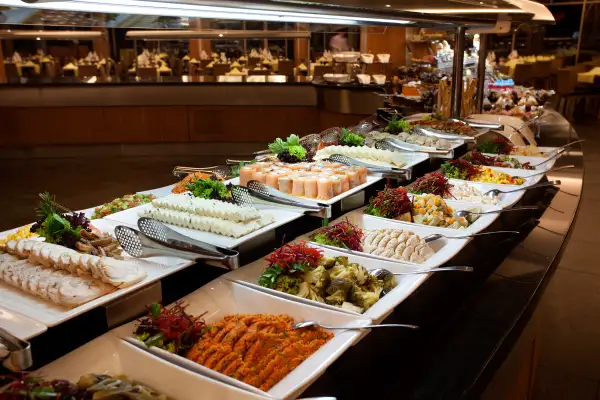The Hidden Costs of Cheap Buffet Meals

All-you-can-eat buffets might seem like a terrific bargain, especially if you score a deal on a coupon website or through an entertainment book.
Be warned, though: That bargain can come with some serious mental heartburn, and even if you manage to avoid anything that looks questionable on the salad bar, you might walk away from your meal feeling not so hot.
"Researchers discovered that lower paying diners feel more physically uncomfortable and guiltier compared to the higher paying diners," said the Cornell University Food & Brand Lab, announcing the new findings. In a series of experiments, diners were charged either $4 or $8 for an Italian buffet lunch, and then surveyed afterward about how they felt. The people who had the $4 lunch were more likely to say they felt uncomfortably full, had overeaten, and felt guilty about how much they had consumed.
The kicker? Diners who paid less for lunch expressed these negative feelings even when they actually ate the exact same amount as their higher-paying counterparts.
The researchers pointed out that these findings have implications for buffet restaurants, which face a challenge of customers who take the "all you can eat" maxim literally (this is also why many of them have renamed buffets as "all you care to eat," so diners don't feel encouraged to binge). While hiking their prices to cover the cost of an extra-hungry diner might seem like the logical solution, this study indicates that the reverse might be true, with people who pay a lower price more apt to feel as if they've gorged themselves when they really haven't.
This work builds on earlier Food & Brand Lab research, which found that people who pay more for a buffet come away with the impression that the food they're eating tastes better. ""People set their expectation of taste partially based on the price—and it becomes a self-fulfilling prophecy," David Just, an economics professor at Cornell and one of the authors of that study, said in an interview last year.
So if you're joining friends for a bargain-priced meal this holiday season, keep in mind that the deal isn't just about the dollars, said Brian Wansink, Cornell marketing professor and the study's co-author. If you're picking the restaurant, focus on food you'll enjoy eating rather than trying to score the cheapest plate possible. And you can avoid "bargain bloat" by paying more attention to what you eat: "Focus on eating more healthy options instead of trying to 'eat your money's worth,'" he advised.
